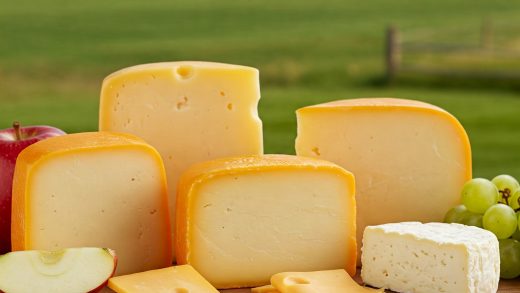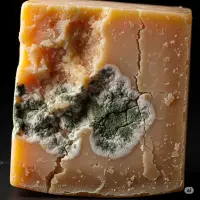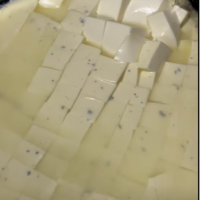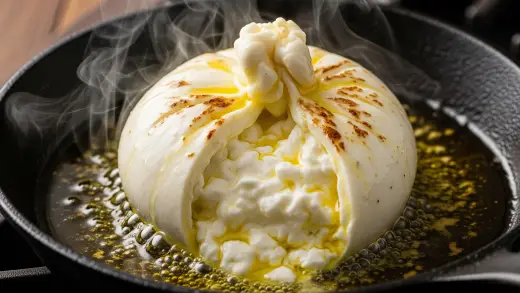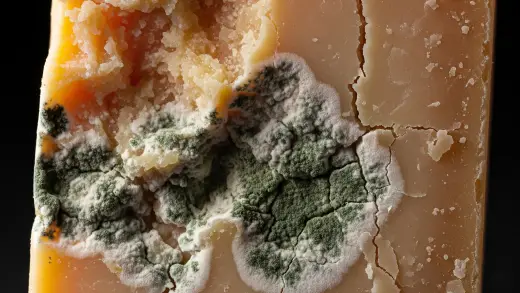Provolone cheese has a mild aroma that is not very distinct. A strong smell indicates spoilage.
The authentic types may have a strong scent that correlates with its flavor. Provolone cheese, a popular Italian cheese, is known for its versatile taste and texture. Its aroma can range from mild to strong, depending on the type and age of the cheese.
The scent can be pungent or sour, with smoked varieties offering a strong smoky aroma. Provolone’s taste profile may range from lactic to smoky, with flavors becoming more pronounced as the cheese ages. While some may find its smell unappealing, the bold taste of extra sharp Provolone often becomes a pleasant surprise. In this comprehensive guide, we will delve into the aromatic characteristics and taste similarities of Provolone cheese, as well as explore its substitutes and usage in culinary dishes.

Credit: dibruno.com
What Affects Provolone’s Scent
What affects Provolone’s scent is a topic of debate among cheese enthusiasts. Provolone cheese is known for its distinctive aroma, which can range from mild to strong, depending on various factors. The scent of Provolone is influenced by several elements, including aging and maturation, the impact of lipase and fermentation, as well as the differences between its varieties, such as Piccante and Dolce.
The Role Of Aging And Maturation
Provolone cheese’s scent is affected by the aging and maturation process. As the cheese matures, its aroma becomes more pronounced. The longer Provolone is aged, the stronger its scent becomes, developing a more pungent and robust aroma. This intensive aging process contributes to the distinct smell associated with aged Provolone cheese.
Impact Of Lipase And Fermentation
Lipase, an enzyme present in Provolone cheese, has a significant impact on its scent. The use of lipase during the cheese-making process can result in a more intense and pungent aroma. Additionally, fermentation plays a crucial role in shaping the cheese’s scent. The fermentation process contributes to the development of Provolone’s unique smell, adding complexity and depth to its aroma.
Differences Between Varieties: Piccante Vs Dolce
When considering the scent of Provolone cheese, it’s essential to understand the differences between its varieties, such as Piccante and Dolce. Piccante Provolone is known for its sharper, more robust aroma, attributed to its longer aging period and intense flavor. On the other hand, Dolce Provolone tends to have a milder and more delicate scent, appealing to those who prefer a subtler aroma in their cheese.
Provolone Cheese Smell Explained
Comparisons To Other Cheeses
When comparing provolone cheese to other cheeses, it is important to note that provolone exhibits a unique aroma that sets it apart from its counterparts. Unlike milder cheeses such as cheddar or mozzarella, provolone often carries a stronger and more distinctive scent. It can be likened to the sharp fragrance of aged Parmesan, but with its own unique nuances.
Description Of The Aroma Profiles
The aroma profile of provolone cheese is characterized by a pungent, sharp scent that is often described as tangy and slightly sour. The distinctive aroma is attributed to the aging process, which allows the cheese to develop a complex set of flavors and odors. In some cases, smoked provolone may present an additional smoky aroma that adds depth to its overall scent profile.
Mild Vs Strong Provolone Nuances
When it comes to the nuances of provolone cheese, there is a distinction between mild and strong varieties. Mild provolone tends to have a more subdued and subtle aroma, making it suitable for those who prefer a milder scent profile. On the other hand, strong provolone exudes a bold and robust fragrance, often with a more pronounced tanginess and sharpness.
“` In the world of cheeses, provolone offers a distinctive aromatic experience that sets it apart from its counterparts. When compared to other cheeses, it stands out with its unique scent, somewhere between the pungency of aged Parmesan and the sharpness of tangy flavors. The aroma profile of provolone is characterized by a pungent, sharp scent that is often described as tangy and slightly sour. Moreover, the aging process contributes to the complexity of its flavors and odors. Mild provolone tends to have a more subdued and subtle aroma, while strong provolone exudes a bold and robust fragrance with a pronounced tanginess and sharpness.Examining Provolone’s Unique Smell
When it comes to cheese, the aroma can play a significant role in its appeal. Provolone, a popular semi-hard Italian cheese, is known for its unique smell that sets it apart from other cheeses. Examining Provolone’s unique smell unveils the identifying characteristic notes, common misconceptions about its scent, and the factors that make Provolone’s smell distinctive.
Identifying Characteristic Notes
Provolone cheese is characterized by a distinct aroma that can range from mild to pungent. The smell is often described as earthy, nutty, and slightly tangy, with hints of sharpness. Some varieties of Provolone may even exude a smoky or aged fragrance, adding depth to its olfactory profile.
Common Misconceptions About Its Scent
One common misconception about the smell of Provolone cheese is that it has a strong, unpleasant odor resembling vomit. However, this misconception may stem from the exposure to specific types of Provolone or instances of spoilage, rather than the inherent aroma of authentic Provolone cheese. In reality, a well-made Provolone should not emit an off-putting scent suggestive of spoilage.
Factors Making Provolone’s Smell Distinctive
The distinctive smell of Provolone cheese can be attributed to various factors such as the cheese’s aging process, the use of specific cultures and enzymes, and the conditions in which it is stored. During the aging process, Provolone develops its signature scent due to the breakdown of proteins and fats, leading to the formation of complex aromatic compounds.
Sensory Science Of Cheese Aromas
When it comes to the sensory science of cheese aromas, understanding how scent and taste interact, the role of olfactory perception in cheese tasting, and the molecular compounds contributing to Provolone’s smell are essential for true appreciation.
How Scent And Taste Interact
The interaction between scent and taste is a crucial factor in the sensory experience of cheese. When you take a bite of Provolone cheese, your taste receptors send signals to your brain, and the aroma released from the cheese simultaneously travels through your nasal passages, significantly influencing your overall perception of flavor.
The Role Of Olfactory Perception In Cheese Tasting
Olfactory perception plays a vital role in cheese tasting. The olfactory system, which is responsible for our sense of smell, works in tandem with our taste buds to create a complete flavor profile. Provolone’s distinct aroma is a result of the interaction between volatile compounds in the cheese and our olfactory receptors.
Molecular Compounds Contributing To Provolone’s Smell
The unique aroma of Provolone cheese can be attributed to various molecular compounds present in the cheese, including butyric acid, propionic acid, and various esters. These compounds contribute to the cheese’s complex bouquet of aromas, ranging from nutty and earthy notes to hints of tanginess and sweetness.
Ensuring Provolone Freshness
If you’re a fan of provolone cheese, you know that its distinct aroma and flavor are part of its charm. However, while provolone is known for its strong scent, it should not have an overpowering or off-putting smell. Understanding how to determine the freshness of provolone is crucial to ensuring a pleasant tasting experience.
How To Tell If Provolone Is Spoilt
When examining provolone cheese to assess its freshness, it’s important to consider both visual and olfactory indicators. A change in texture, the presence of mold, or a sour smell can all be signs that the cheese has spoiled.
Signs Of Spoilage: Visual And Olfactory Indicators
Visual indicators of spoilage in provolone cheese may include mold growth, an alteration in color, or a slimy texture. On the olfactory side, a strong ammonia smell or an off-putting sour odor can indicate spoilage. If the cheese exhibits any of these signs, it is best to refrain from consuming it.
Safe Consumption And Storage Tips
Properly storing provolone cheese is essential for maintaining its freshness. Store it in the refrigerator in a sealed container or wrapped tightly in parchment paper to prevent it from absorbing other odors. Additionally, consuming provolone cheese before its expiration date and opting for smaller portions can help ensure its quality.
When purchasing provolone, choose a trusted supplier and inspect the packaging for any signs of damage or improper storage. Remember, a mild, characteristic scent is normal for provolone cheese, but any overpowering or unpleasant odors could signify spoilage.
Frequently Asked Questions Of What Does Provolone Cheese Smell Like
What Is The Aroma Of Provolone Cheese?
The aroma of provolone cheese is strong and distinctive, with sweet or smoky notes. It becomes more pronounced with age and texture. It should not have a foul or rancid smell, which may indicate spoilage.
What Does Provolone Taste Similar To?
Provolone cheese has a mild taste and a subtle aroma. It should not smell like vomit; a strong smell indicates spoilage. Its flavor is similar to Mozzarella, with a fresh and mild taste.
What Is The Smell Of Cheese?
Provolone cheese has a strong, pungent aroma, which can be sour or smoky. It is not supposed to have a distinctive smell unless it has spoiled. A strong ammonia smell indicates spoilage. The taste becomes stronger with age and texture.
How Do You Identify Provolone Cheese?
Provolone cheese has a mild scent. Strong odors indicate spoilage. Authentic provolone has a strong, distinct aroma that aligns with its flavor. Smoked provolone has a potent smoky scent. Spoiled provolone can give off a strong ammonia smell and should be discarded.
Why Does Provolone Cheese Have A Strong Smell?
Provolone cheese has a strong scent because of its aging process, which develops its characteristic aroma and flavor.
Is It Normal For Provolone Cheese To Smell Like Vomit?
Certain types of Provolone cheese use lipase, which may give it a strong initial flavor resembling vomit. However, authentic Provolone cheese does not have a distinct vomit-like smell.
How Can One Determine If Provolone Cheese Has Gone Bad By Its Smell?
If Provolone cheese has a strong ammonia smell, it may have gone bad. A distinct odor will indicate its spoilage, and consumption should be avoided.
Conclusion
Authentic provolone cheese is known for its distinctive scent, which corresponds to its strong flavor. While it may have a strong aroma, it should not have a foul smell. A pronounced odor can indicate spoilage, and a strong ammonia smell suggests that the cheese has gone bad.
Remember, provolone is supposed to have a unique scent that reflects its taste.

